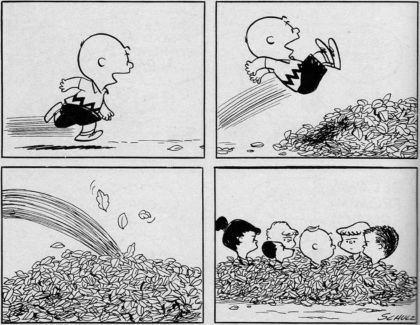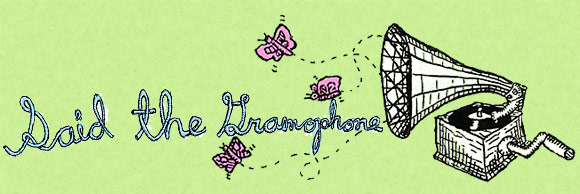
Yura Yura Teikoku - "Ohayo Mada Yaro". The first half-dozen episodes of The Loose Gang, no one really realises what it is. It's a funny sitcom, okay it's hilarious, but that's all people are saying. "Check out this program. Loose Gang. 'Loose' like 'free.'" It's got Mark Pimms, the guy from Big Country, that hysterical kid from Funny People, and the chick from Friday Night Lights. Mostly people don't describe the plot because the plot doesn't sound very interesting: a group of friends in a city, and not-friends, just acquaintances, sort of like Friends but with all of the city as the cast. Some of the characters you see more often, but there's always new faces - the camera's always veering off into a new apartment window, lingering on a different corner diner. Anyway, at first it's just that slightly buzzy new show, the show you see mentioned on Facebook or Twitter and ignore, because what's The Loose Gang anyway?, until that cute friend of R's talks to you about it over a picnic table one night and you go home and stream it, stream all of it, the entire first season, in the space of 24 hours. This is how it was for most people, something shared but private, until some time during the second season. It wasn't long after the show won its first Emmy, for writing. One of the characters, Louis, finally told another, Stef, that he was in love. And another character, Hamid, died. And something in the way these events happened on the screen made them feel real. The events felt rough and beautiful and that dull shade of true. Then came episode s02e04, "Ripe Lemons", which was about the wedding of a minor character, a schoolteacher, and included none of the principal cast. The next day, America seemed to have dreamed a common dream. At work, at meals, "Ripe Lemons" was the only thing people wanted to discuss. They were emailing their friends, telling them to watch it, to watch the one episode even if they hadn't seen the rest of the show. Speaking at the Emmys the next year, show-runner I. Ella Ruskin said just that "we tapped into something". In the New Yorker, Wire creator David Simon suggested "they tapped into grace". It was as if The Loose Gang had invented a new kind of television. This wasn't "TV as novel", "TV as 50-hour movie"; it was TV as song, lighthouse, common mythology. Gorgeous, courageous, crooked and very funny. It felt like a good thing, such a good thing.
The Loose Gang ran for four seasons.
[buy this wonderful reissue of two Yura Yura Teikoku albums, reputedly classics, but new to me, scarcely heard of here; they are a Japanese indie band that has been active since the 1990s]
Posted by Sean at April 22, 2010 2:01 AMMan you had me all googlin' and whatnot.
Posted by archilochusColubris at April 22, 2010 3:06 AMDespite all, Japan has flourished in indie and they totally deserve it. My favorite Jap indie talent is Shugo Tokumaru, he's famous as Japan's Sufjan Stevens. His 2008 album Exit was the best thing I heard that year.
Nice to have you back. I loved that show
Posted by Moominmamma at April 22, 2010 5:10 PM"The next day, America seemed to have dreamed a common dream."
This is lovely. Thank you.
Welcome Back Kotter.
Posted by BMR at April 23, 2010 6:34 AMHello, author. A wave of unease washed over my spine as I read this. I felt my teeth start to clench and my face twist itself into a grimace. That reaction was completely visceral, but it wasn't hard to intellectualize what was going on: the quality of your writing was embarrassing me for the second time in as many weeks.
I promise that this isn't incendiary, and in fact I struggled for some time about whether or not I should post anything at all. The act of criticism can feel so smug, or even hubristic. Ultimately, however, the reason that a terrible entry like this one makes me blush and squirm in my seat is that I see a lot of talent and potential in the things that you do. You can turn a phrase in a beautiful way and your concepts tend to be creative and even sometimes unique.
To give it to you straight, from where I'm standing, the main problem with your writing is that you don't know how to change gears tonally. Everything comes out feeling like a fragile, delicate, emotional crystal -- whispered to an intimate coffee house crowd with a quivering voice on the verge of tears. When it hits its target, it's a lovely trick. But with an entry like this it completely wrecks the concept.
Ugh, I'm so sorry for posting this on your blog, I sincerely just want to see you improve. This isn't something I normally do, I just got so bugged out and I couldn't help myself.
Posted by Dillon at April 25, 2010 10:59 AMThis above comment made me flash back to unpleasant writing workshops. "Check it, dude, you've got some grinding in your tonal gears," etc.
Anyway, I thought this was great and strange. Good work, Sean. Always fun to read your stuff.
Posted by Kevin at April 26, 2010 10:02 AMOhhh, NOW I get it.
And thanks to Dillon - I'm no writer, but I found his reply particularly valuable to my understanding of the process.
Posted by Dave at April 26, 2010 1:24 PM



